A Glimpse of the History of Engaged Scholarship, Service Learning and Community Service at Incarnate Word
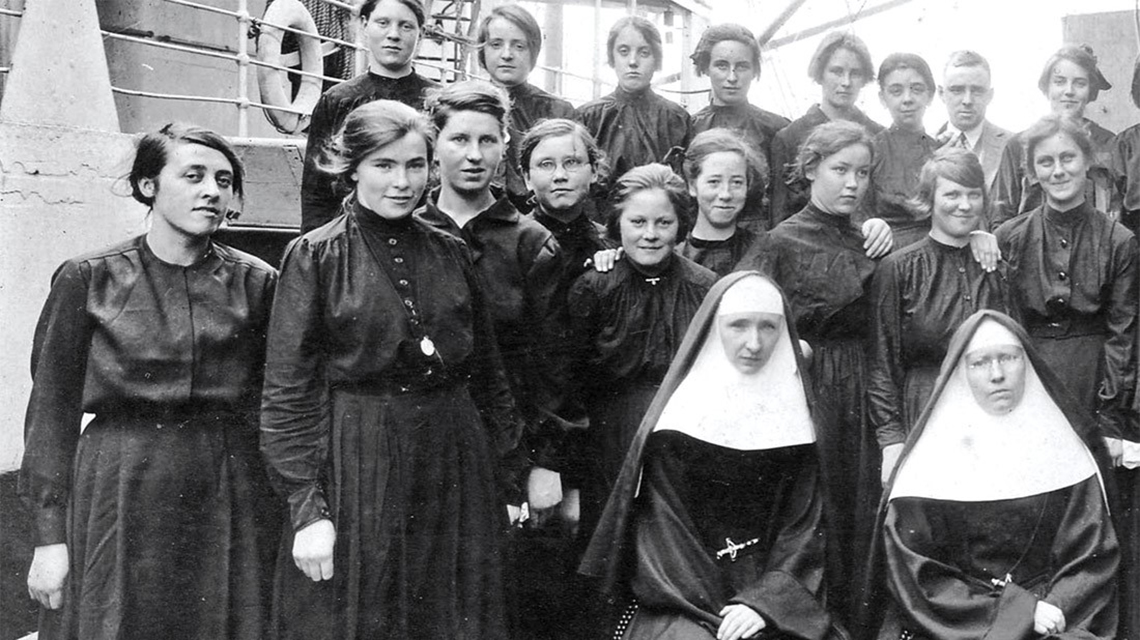
The origins of Incarnate Word were in response to the San Antonio mayor’s urgent plea to Claude Dubuis, then Bishop of Galveston, to provide health care for citizens dying of cholera in the 1860s. Three young French women, Sisters, responded to Bishop Dubuis’ request to help the city and soon after would found the first public hospital, Santa Rosa Infirmary. As time passed, the Sisters of Charity of the Incarnate Word taught others to nurse with them. Ever since then, service to the community and education have been integrated into the Incarnate Word tradition. The Sisters received a charter from the State of Texas to found schools in 1881. Children were reminded that the privilege of education invited them to care for others. Education leads to service. Thoughtful service can invite systemic change.
Examples of that can be read in Promises to Keep by Sister Margaret Patrice Slattery, CCVI, a fascinating two-volume history of the Sisters of Charity of the Incarnate Word, San Antonio, which has been recognized as an outstanding publication by the Texas Catholic Historical Society. A unit of the Confraternity of Christian Doctrine had been established at Incarnate Word College in 1941. “Students were trained to be teachers of religion and gave instruction in Christian doctrine to children who could not afford to attend a Catholic School. Most of their teaching was done in a low-income area of the city where they renovated a dilapidated building by repainting the walls, replacing a broken window, and securing enough furniture to make the structure suitable as a catechetical center and chapel where Mass was celebrated on Sundays. The students’ work in catechetical instruction and the establishment of Santa Maria, as the neighborhood center was called, led ultimately to the foundation of St John's parish.” The text also notes that in 1944, the IWC chaplain, Father John Hayes focused on a concern for social justice and the poverty rates in San Antonio. “According to Sister Aloysius Clare Maher, “He always reached out to the downtrodden, the forgotten ones, and encouraged the students to do the same.” Urging them to work for and with the poor in San Antonio, he said, “Your mission is here. These are the people who need your help.” (Promises to Keep, 1995, vol. 2, page 342)
In the 1980s at Incarnate Word College, now the University of the Incarnate Word, faculty and administrators were eager to institutionalize the tradition of service so that it might be carried into the future.
Development and Institutionalization of Service-Learning at the University of the Incarnate Word, 1989-2001
(As updated Nov. 15, 2002 with contributions from Dr. Bob Connelly and Dr. Pat Lonchar)
1989: New Core Curriculum initiated with 45 hours of Community Service required for graduation and an emphasis on cross-disciplinary integration. Twenty-hours of this was service learning within classes. Community Service Form developed that included student written reflection in response to five questions.
1990: Senior synthesis (SS) serves as the capstone course for the New Core. SS offered an opportunity for reflection and integration.
1991: Five hours of service are required as a part of the Dimensions of Wellness curriculum. Dimensions of Wellness is conceived as a “Freshman Synthesis” keystone course. Community Service Documentation forms required.
1992: Thirty hours of Community Service must be completed before Senior Synthesis, an additional 15 to be completed during the course itself.
1992: Office of Social Concerns created to coordinate service opportunities.
1995: A faculty person and the Coordinator of Campus Ministry attend the National Institute on Service and Learning.
1995: All Community Service hours must be completed before Senior Synthesis.
1996: Ernest Boyer writes about “The Scholarship of Engagement” in the Journal of Public Service and Outreach: “…[T]he academy must become a more vigorous partner in the search for answers to our most pressing social, civic, economic, and moral problems, and must reaffirm its historic commitment to what I call the scholarship of engagement.”
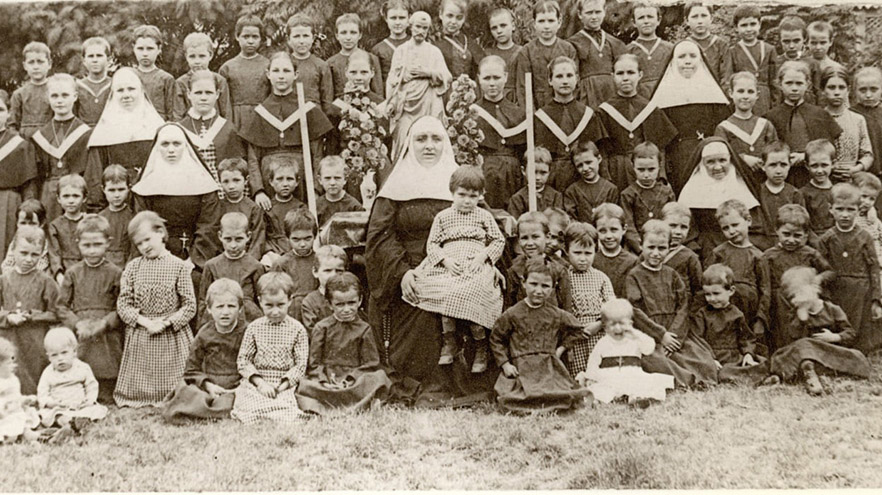
1996-97: Lilly Planning Grant for a consortium of five schools to do a research study of service-learning at religiously-affiliated institutions.
1997-99: “Breaking Barriers in a Border Community,” a Lilly Faculty Development Grant awarded for the University’s participation in the research study of the consortium.
1997: The New York Times Magazine reports that “out-of-the-classroom, or ‘service,’ experience(s) and cross-disciplinary teaching” trends will most likely “give rise eventually to a transformation in the training of professors.”
1997: Ed Zlotkowsky, national leader in service-learning, is the keynote speaker for the August faculty workshop.
1997: “Scholarship Reconsidered: Priorities of the professoriate,” by Ernest Boyer, is distributed to all faculty.
1997: Senior Synthesis is discontinued, but the 45-hour community service requirement remains.
1997: The Service-Learning Task Force is formed in the Spring Semester.
1997-1998: Four Service-Learning pilot courses are run (in Nursing, Information Technology, Nutrition, DW/CD/Computer literacy).
1998: Two summer workshops for faculty on Service-Learning with consultants from Portland State and Santa Clara Universities.
1998: Service-Learning Guidebook completed.
1998: Academic Vice-President encourages faculty at a special forum to consider the New American College (Boyer, Carnegie Foundation) model for scholarship and teaching.
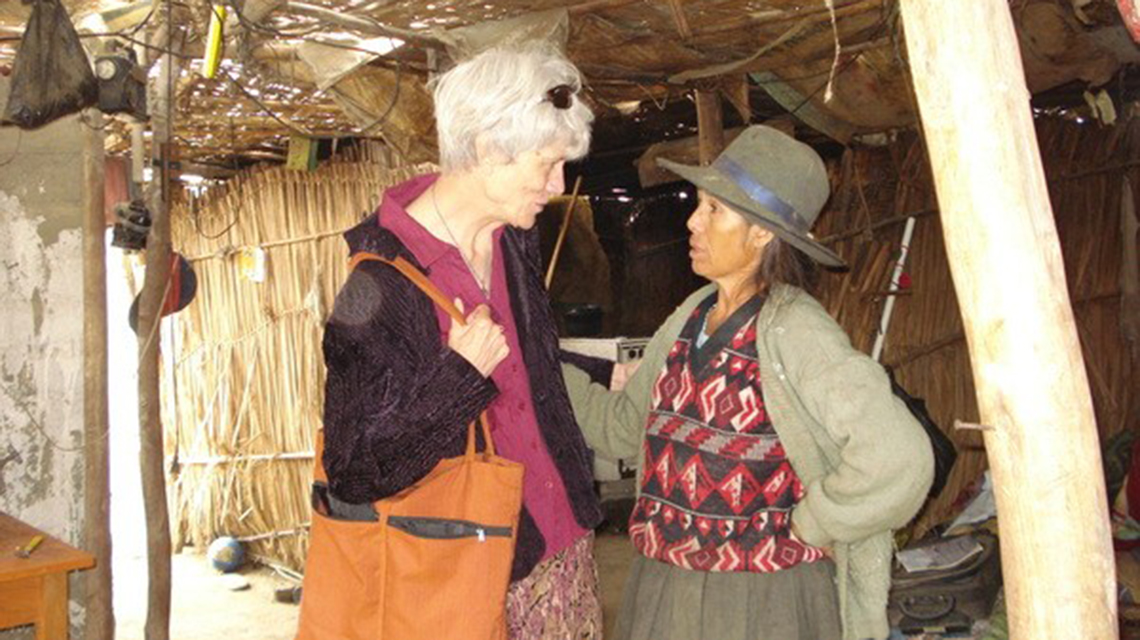
1998: Two Faculty Forums introduce dialogue about Campus Conversations, a program sponsored by the Carnegie Foundation (formerly headed by Ernest Boyer).
1998: New Guidelines for rank and tenure include the Boyer categories of scholarship.
1999: Faculty Council approves recommendations from the Service-Learning Task Force, which includes the Service-Learning Guidebook, an office, and a process to begin institutionalizing Service-Learning at the university. The Service-Learning Committee becomes a subcommittee of the Curriculum Committee.
1999: Pilot Learning Community courses offer interdisciplinary and service components.
1999: Some honors courses require Service-Learning.
1999: Health ministry established for the St. Philip of Jesus parish. St. Philip of Jesus becomes a Service-Learning partnership organization.
2001: First meeting of the Service-Learning Advisory Council, including UIW faculty, administration and representatives of Service-Learning Partnership agencies/initiatives.
2002: A minor approved in Nonprofit Management of Food and Apparel Recovery with a Service-Learning requirement.
2002: Service-Learning Committee approves a Checklist of questions for identifying a Service-Learning course, a designation approval form, and instituting the Ed Zlotkowski Award.
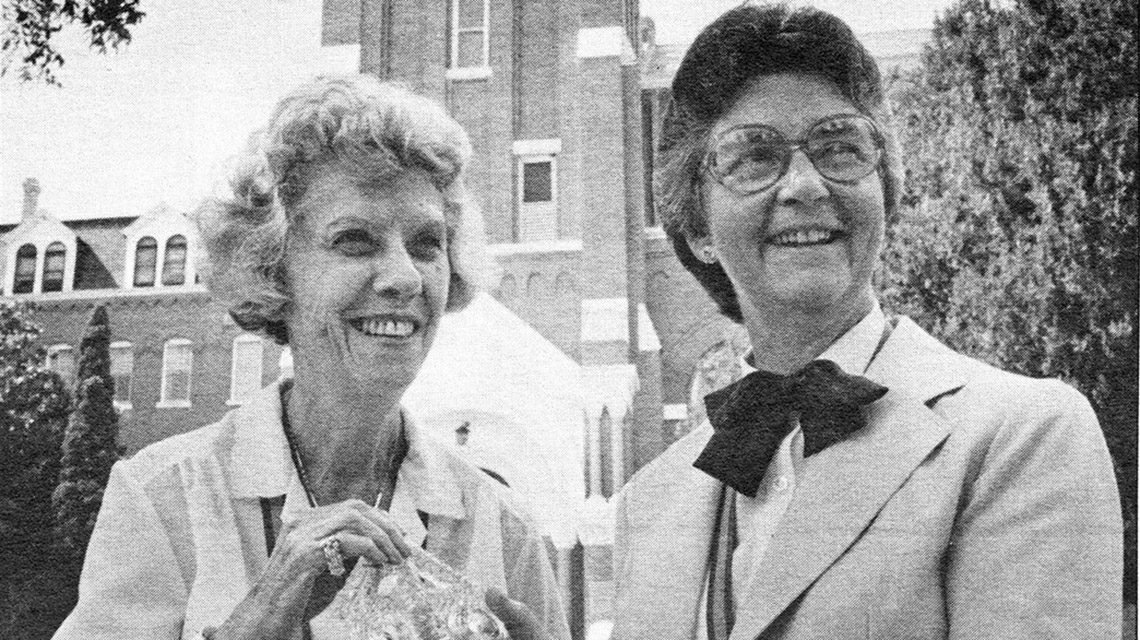
Service-Learning at UIW
(Prepared by Dr. Bob Connelly and Dr. Patricia Lonchar, 8/22/03)
When UIW joined with four other religious-affiliated institutions in 1996 to seek funding from the Lilly Foundation to assist our implementation of Service-Learning (S-L), we did so knowing that such an initiative was inherent within our Mission. For three years, the Lilly grant supported our Service-Learning implementation and faculty development efforts. At the close of the Lilly grant, the University had established Service-Learning as an aim in its Vision Document and accepted Service-Learning activities as appropriately meeting the Graduation Service Requirement for students. Further, four distinct programs integrated Service-Learning Pilots into their course structure; assessments of these pilot courses guided the Service-Learning Committee to formulate processes for continued addition of Service-Learning courses into the University curriculum. Formal procedures for official S-L course designation in the college schedule are now in place and steps to establish a Service-Learning transcript have begun. Service-Learning has also become one aspect of a faculty member’s performance criteria. A Service-Learning Advisory Council, composed of external community members, serves as a vital link between campus programs and the greater San Antonio community.
But processes, forms, and vision inclusion are not the most laudatory of the Service-Learning initiatives at UIW, important as these areas are. The results of UIW’s Service-Learning initiative are most evident and most significant in the actual work of service and learning now occurring in the San Antonio community by UIW faculty and students. This work with underserved populations includes:
The Ila Faye Miller School of Nursing and Health Professions now operates a Health Ministry as part of its Service-Learning program: Nursing students assist in various health education and monitoring tasks, nursing faculty staff the programs, PE majors assist in supervision of wellness activities, Business majors assist in data management procedures, and Nutrition majors conduct Nutrition Information sessions. Most of this work is conducted in both English and Spanish.
Besides work in the Health Ministry of Nursing, the Nutrition program in the School of Mathematics, Science and Engineering also works closely with the San Antonio Food Bank in food recovery—a Service-Learning activity that has also given rise to a Non-Profit Food and Clothing Recovery Minor that combines Business, Fashion, and Nutrition courses with a service focus.
Freshmen and Sophomore students in Computer Information Systems in the School of Media and Design serve as mentors/tutors to individuals living in the retirement center located next to the University campus and serve a similar function at a local community center in an after-school program for young adults.
Psychology majors in the College of Humanities, Arts and Social Sciences (CHASS) conduct parent-training classes and mentoring in a local community center for young parents and their children—in English and in Spanish. In addition, Psychology students also assist that same center in its assessment of its outreach programs—Meals on Wheels and Senior Day Care.
Education majors in the Dreeben School of Education have added Literacy Workshops/Play Days as part of their course work. These majors also established a Peter Rabbit Literacy Garden at the San Antonio Botanical Garden and have served as advisors/consultants for several non-profit groups who wish to establish and maintain safe play areas for children.
Theatre majors in CHASS now have a capstone course that requires students to design S-L projects using theatre-related skills. Projects may involve working with the homeless, the dying, children, in arts organizations, museums, hospitals, or shelters.
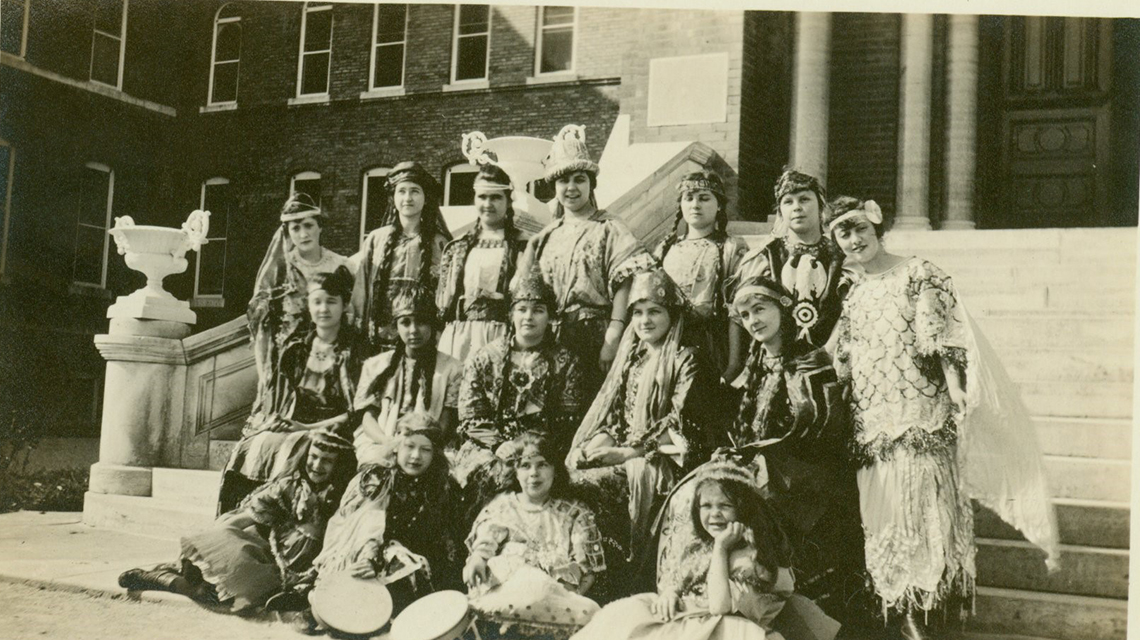
Plans are currently in progress for English composition students in CHASS to conduct interviews and compile a history of South San Antonio that will enable that area to regain visibility and secure its rightful place in the city’s rich history. Additionally, the honors composition course continues to pair U.S. students with International students in order to foster better understanding by developing written and verbal reports that profile the international students’ lives.
UIW Faculty and Friends Found and Develop Women’s Global Connection as a Path of Service Learning
In August 2001, after about a year of brainstorming and work to implement, a press release went out to the general public that the San Antonio and Houston Incarnate Word Sisters had opened up a website educational ministry on June 1: “Considering that our two Congregations minister in El Salvador, Guatemala, Ireland, Kenya, Mexico, Peru, the United States, and Zambia, a web site seems like an appropriate ministry to connect us and empower us. The web site is sponsored as a commitment of our ministry to improve the status of women through advocacy, justice, health care, and education. Read, educate yourself, and be motivated to act as a strong unified voice for women.” Pages of the site dealt with Social Justice, Legislative Affairs, Health Issues, and Education. This was initiated by the Generates including Sister Walter Maher as a member. Starting in 2000 Sisters Dot Ettling, Martha Ann Kirk, Michele O’Brien, and Yolanda Tarango had worked with the Houston Congregation to define the ideas and implement them.
As Sisters Dorothy Ettling and Martha Ann Kirk were active in that, Ettling, as a teacher in the Education Department, was encouraging faculty to gather their experiences of service-learning and be even more creative and expansive. From that thinking, Women’s Global Connection emerged. Dr. Kevin Vichcales as the Dean of Graduate Studies and Research encouraged innovative thinking among faculty. He wrote about the ideas behind and development of WGC at the beginning of Reach Out Africa, Studies in Community Empowerment, Sustainable Development, and Cross-Cultural Engagement, a book that he and Ettling edited which was released in 2013. Unfortunately, she had suddenly died during the layout of the book and never saw the print edition.
Dr. Vichcales wrote:
Established in 2001, Women's Global Connection (WGC) is a nonprofit organization founded in partnership with UIW to further education and research in the global community, particularly in the least-advantaged regions and countries of the world. WGC's mission is to promote the learning and leadership of women locally and globally through collaborative networks and partnerships. Through a variety of methods, WGC offers space for sharing women's wisdom, experience, and spirituality for the purpose of creating a just and sustainable global community.
The partnership between UIW and WGC has been mutually beneficial and has shown how, through systematic cultural engagement, sustainable pathways to a better future may be forged. The models developed and implemented by the partners have proven successful and are replicable on a broader scale. The service-learning educational model implicit in the work demonstrates the true value that this model offers to humanity---the positive benefits that may be produced by those who engage in structured preparation coupled with hands-on implementation and learning.
As is often stated no plan survives the first step of implementation, given that reality forces us to reconsider our original thoughts and questions and adjust to the realities we find on the ground. This is been true of this project. But for those willing to commit themselves to the experience, engagement with others in an open dialogue and with the intention of discerning true needs and proactively seeking culturally informed sustainable solutions has offered the most constructive means of achieving ultimate goals. The numerous participants in this partnership have witnessed the forging of new communal bonds that have been nothing short of life-altering.
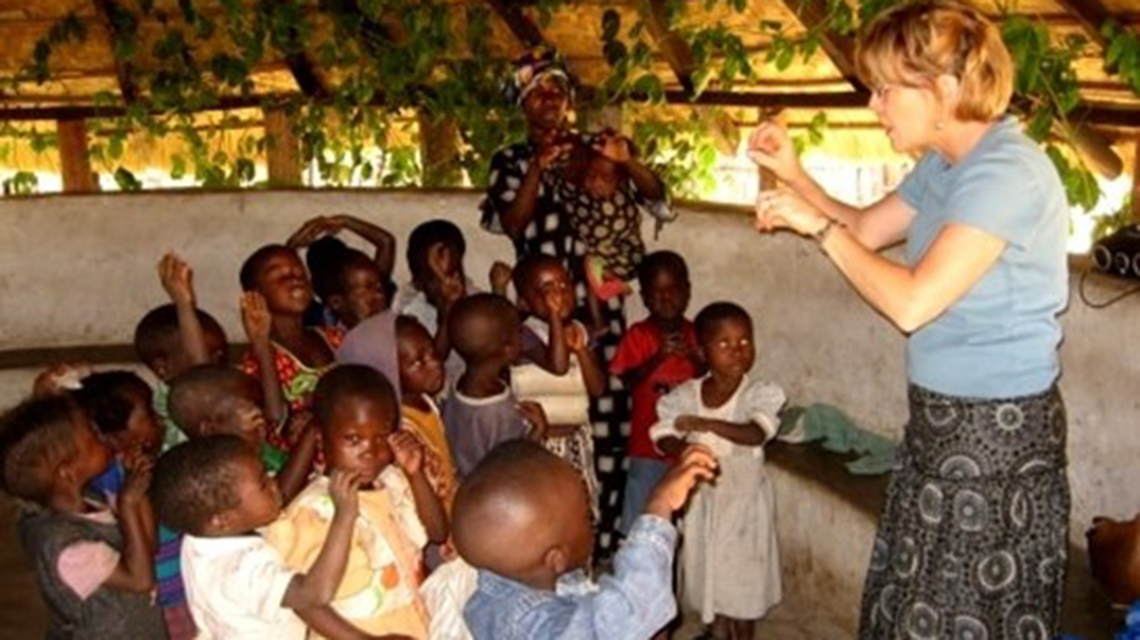
Each participant has lived the service-learning experience and gained much more from his or her participation than what was originally expected. All have commented on how their experiences have formed their thinking on the subjects of development, engagement, and community. While the community is typically defined as among members of a given cultural context, a new idea of community, forged via the heat of the service-learning experience has expanded that traditional definition to one that is much broader, cross-cultural, and linked via the bonds of our shared humanity.
As a research endeavor, this project confronted the partners with multiple unique challenges of how both to engage in positive work on the ground and also to proactively utilize the various initiatives as means of furthering the institution's research mission. We think you will agree that the work presented demonstrates that these obstacles were overcome through the dedicated work of the partners. It is our hope that the contributions made here to meet your expectations. (Kevin Vichcales in Reach Out Africa, Bloomington, IN Archway Publishing, 2013, 2014, pages xvii-xviii).
The text Reach Out Africa continues with Sr. Dot Ettling describing methods and theory of community-based participative research that emerged from faculty and students’ engaged scholarship and projects with the people of Tanzania and Zambia over a period of about ten years. Faculty and students wrote chapters of the book describing individual projects. Some of this can be seen online with even more examples of successful projects: “WGC is committed to a participatory approach in all activities with our community partners. Community-Based Participatory Research (CBPR) forms a foundational base in our capacity building activities and research. Although each setting offers a unique context, this figure depicts the interconnected way we view our engagement in research for sustainable development. Click each area of the graphic to see the research we are doing in that area.” at women's global connection.
View stories and pictures of these projects by the WHC in 2019. These initiatives are being continued in 2020 and 2021 though the WGC office has been closed following COVID-19 protocols.
$15,000 Grant for Service Learning
Worship Opening Hearts and Hands to Service
Directed by Sr. Martha Ann Kirk, CCVI, 2006
With funding from the Lilly Foundation, the Calvin Institute for Christian Worship had a program, “Worship Renewal Grants.” Sr. Martha Ann Kirk was awarded a grant in 2005 in light of a proposal focusing on cultural inclusion. When she went to participate in the orientation at Calvin College, she accidentally discovered their well-developed Service-Learning center. She brought information on that to Dr. Robert Connelly and others. This led to the development of a 2006 grant “Worship Opening Hearts and Hands to Service,” remembering that “Jesus took a towel and washed the feet of his disciplines ...” and “Jesus took bread and said … this is my body given for you. ...”
The grant proposal noted that understanding of and participation in worship would be deepened through exploring four biblical themes in relation to service, justice, and peacemaking.
The themes are:
- Feeding
- Sheltering
- Healing
- Reconciling
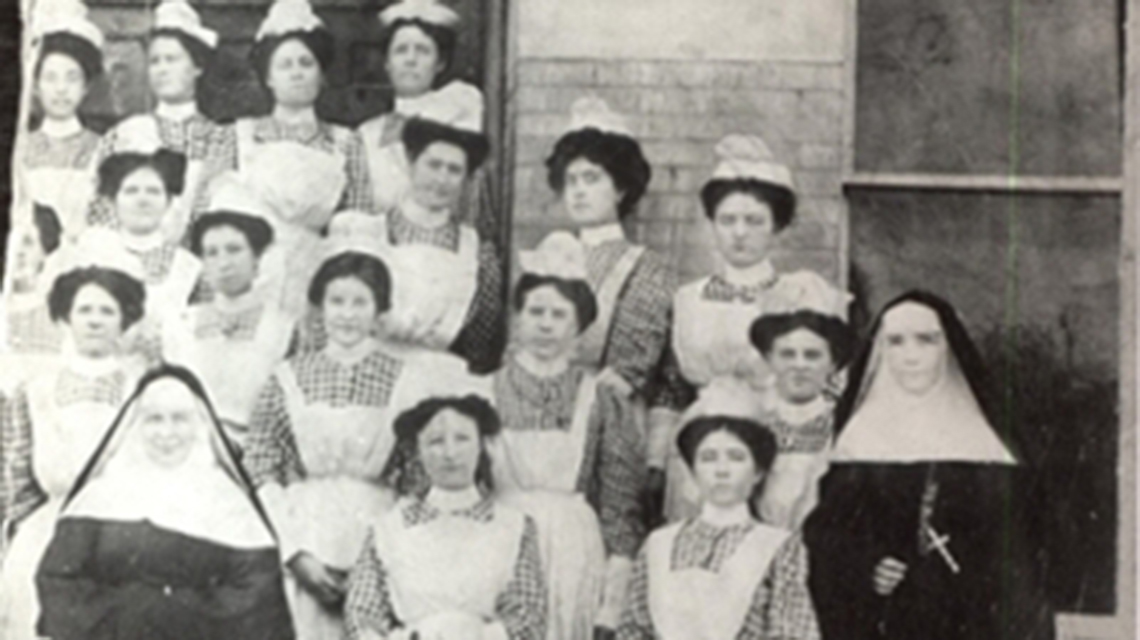
In light of each of these themes, there would be:
- A Gathering of about three hours with education about worship, prayer, and a meal
- Community service of about three hours
- A Reflection to integrate one’s experience of the service, worship, and on-going purpose and meaning in life.
This program would benefit students of the University of the Incarnate Word and other members of our worshiping community. It would be advertised to local churches of all denominations and build on those contacts made through the years.
The motivation for this grant comes from both the positive desire to glorify God in worship through loving our neighbors more, serving as Christ served, and building God’s reign of justice.
The motivation also comes from recognized needs:
- In our culture at this time, many people are seen to be going to worship to learn how to prosper rather than to learn how to give. Private spiritualities stemming from selfishness are being nurtured in some approaches to worship. The call to service, not self-interest will be emphasized at the Gatherings and in the worship on campus throughout the year. We wish to teach more music related to service, justice, and peacemaking.
- Through community service and service-learning at UIW has been improving over the years in that students help more people, faculty continue to be concerned that there is not an adequate reflection on what was done, what was learned, and how this might influence one’s life in the future. In this grant program thinking back on the themes from scripture and worship, the experience of service, and how this impacts one’s life is essential.
- Over 65 percent of our students qualify for some type of financial assistance. Students often have heavy loads of work as well as study. The funding of Student Animators for this grant is a deliberate effort to give meaningful work integrating service and meaning in life.
- Remembering that people’s eyes “were opened in the breaking of the bread,” both the Gatherings and the Reflection sessions will include a meal. University students, mostly nourished by fast food, lack experience of and skills in mealtime presence to other humans. The University dining room and café both have televisions, which is one of the ways people avoid personal presence to other human beings. Sacramental spirituality reflects the incarnation, the presence of the Divine to humans. Human presence mediates the grace of God. Developing skill and comfort in human relationships around a table is a way to better relationships globally.
As the year unfolded, students learned from and participated in reflection with:
HEALING: (1) Dr. Kathi Light who brought the ethical question “Is healthcare a right or a privilege?” and urged service through advocacy work for affordable health care, (2) Dr. Ricardo Riojas and others working with Los Quijotes who take healing to Mexico.
RECONCILING: (3 ) Rev. Phineas Walker urged service through education and advocacy for the U.S. Department of Peace, (4) Rev. Ann Helmke, animator of the SA peaceCENTER explained and invited students to local efforts in the spirit of Gandhi.
SHELTERING: (5) Partnerships with local communities who welcome refugees. (6) SAMM’s Shelter, Catholic Worker House,
FEEDING: (7) “Feed My Sheep,” monthly trip to meet people in Piedras Negras and share food, (8) While students did activities like help the Food Bank, the United States Conference of Catholic Bishop's statement moved service to a deeper level: “A table is where people come together for food. For many, there is not enough food and, in some cases, no table at all. A table is where people meet to make decisions—in neighborhoods, nations, and the global community. Many people have no place at the table. Their voices and needs are ignored or dismissed.”
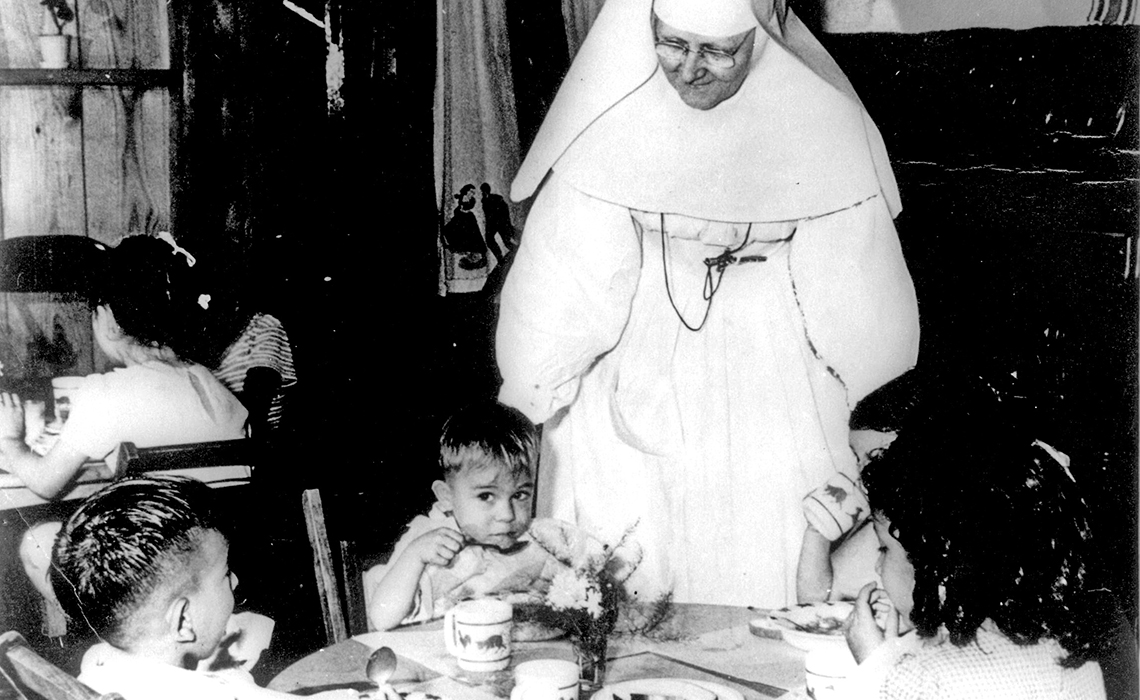
Unifying ideas developing since the 1980s and faculty involved, recognizing that Our Lady of the Lake University had opened a center for service learning in 1997, Sr. Dorothy Ettling, CCVI, affectionately known as Sr. Dot, laid out plans for a Center for Civic Leadership early in 2012. With a graduate Education student whom she supervised, some financial support from CHRISTUS Health, and permission from UIW, the center, with a group of students information called Cardinal Community Leaders, was developing.
In 2013, Monica Cruz was hired as an assistant to Sr. Dot and various faculty contributed ideas and support.
"Develop Leaders Who Promote Social Justice..."
-Mission of the Center
In April 2014, Sr. Dot invited Sr. Martha Ann Kirk, who had been the co-director of the IW Justice and Peace Graduate Program, to work with her and carry forward the vision. That invitation was not fully accepted until Sr. Dot was dying in September 2014. Then-president Dr. Agnese encouraged Sr. Martha Ann to do this. She began gathering extensive information on engaged scholarship, civic engagement, and service-learning in Spring 2015 and grant writing.
Monica Cruz, the center director, had Sr. Martha Ann lead a series of focus groups with faculty from every school sent by their deans in regard to Service-Learning. Two main themes emerged: faculty seek assistance from center staff, and that they seek on-going pedagogical formation in good practices.
She researched, compiled, wrote, and posted all that is on the Faculty Resources pages of the ECCLS website and posted information about Engaged Scholarship and Service Learning in the spring of 2016.
In 2016, considering the Service-Learning Task Force that began in 1997 and was building fairly consistently until 2005, she organized a Service-Learning Committee. The lists and forms used for designating classes as Service-Learning had been lost.
She organized so that the Edward Zlotkowski Service Learning Award was revived in 2017.
She initiated the Service-Learning Showcase after collecting extensive information at the state Gathering for professionals in Arlington.
She considered these ideas from the Mission, Values, and Vision of the center and extensive research that indicates working in partnerships with faculty towards educational goals is what centers do:
- Develop leaders who promote social justice
- Facilitate a sense of global citizenship and cultural sensitivity
- Encourage an inclusive interfaith perspective
- Connect local to global
- Advocate for a deeper understanding of social justice issues
- Guide by the principles of Catholic Social Teaching, promoting the common good by educating enlightened and concerned leaders committed to learning, research, advocacy, and service for those in most need
- Collaborate “to achieve individual/social transformation while respecting the dignity of each individual and all creation,” from Mission, Values, and Vision for the center.
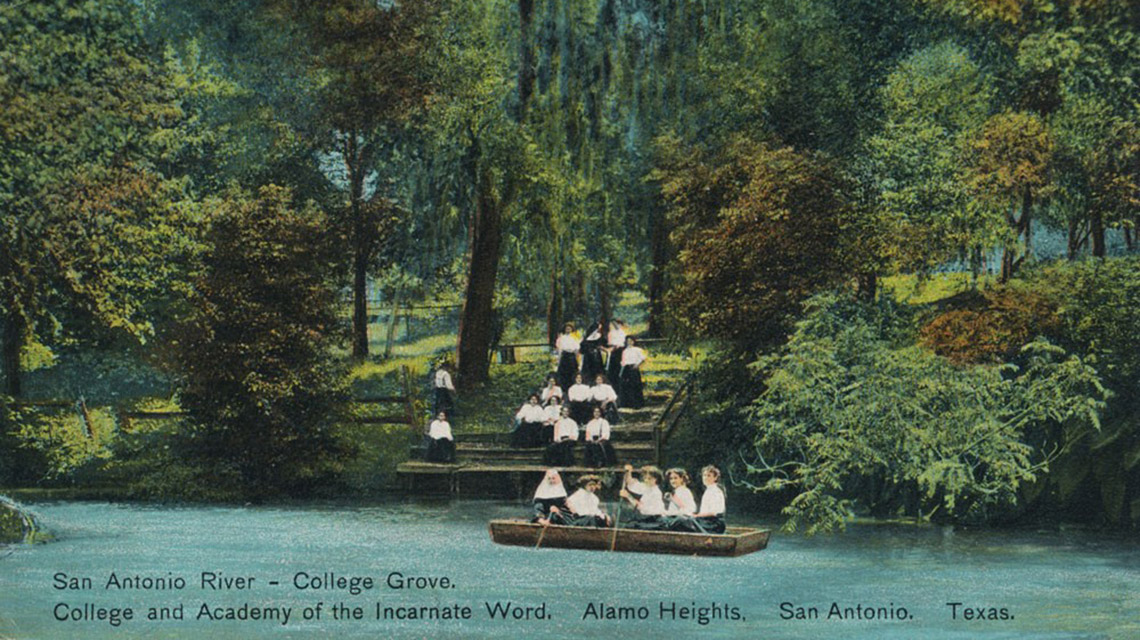
In light of those, she has written, directed, and implemented successfully small grants that provided funds for faculty formation in social justice, service-learning:
- Human Slavery and Trafficking, Founders concern for the most vulnerable (Lilly Foundation, 2016)
- Interfaith Literacy and Service (Interfaith Youth Core, 2017)
- Catholic Nonviolence Movement (Sisters of Charity of the Incarnate Word, 2018)
- Compassion Integrity Training to further SA as a City of Compassion (Sisters of Charity of the Incarnate Word, 2018)
- Developing Interfaith Leadership (Interfaith Youth Core, 2019)
- (Interfaith Service Learning and Refugees grant proposal were submitted to the Interfaith Youth Core, but with the pandemic, their regular grant cycle has been interrupted.)
- Identifying Needs, Developing, Assessing Service-Learning Support, Pilot of Four-Year Longitudinal Study on Social Justice Transformation (UIW Graduate Research Assistant Award, 2020)
- Critical Thinking, Compassion, Civic Engagement, a pilot project in the “Pedagogies for Social Justice” grant category (Wabash Center, 2020)
These faculty formation grants have led to various stages of growth, flowering, and fruitfulness. One example is the human trafficking grant in 2016, which led to a project of engaged scholarship, service-learning, research, and action and which has been featured in The Journal of Nursing Practitioners.
Sr. Martha Ann wrote the nomination that led to the University of the Incarnate Word getting the inaugural United Way Higher Education Community Impact Service Volunteer of the Year Award on April 9, 2019, at the Tobin Center for the Performing Arts.
The nomination explained:
At the University of the Incarnate Word, during the 2017-2018 Academic Year, 3,666 students were in classes where the faculty had student volunteers out serving the San Antonio community. Engagement in service is a high impact learning method. This is a third of the UIW student body. During this time 99 faculty members taught 297 class sections with service learning. Those sections span 31 different departments and 99 different faculty members, over 1 in 10 of our faculty community. Clearly, Service Learning activity is not focused in any single department, discipline, or college or school. Service to the community is a pervasive approach at the University of the Incarnate Word rooted in its mission. This outpouring of service is in continuity with Incarnate Word history. By 1869 typhus and two cholera epidemics had hit San Antonio, one killing about 10% of the population. There was no hospital for the public. The mayor heard that Catholic Sisters had started a hospital in Galveston and he sent an urgent plea seeking help. This is the 150th anniversary year of the Sisters of Charity of the Incarnate Word founding Santa Rosa Infirmary in response to city needs.

